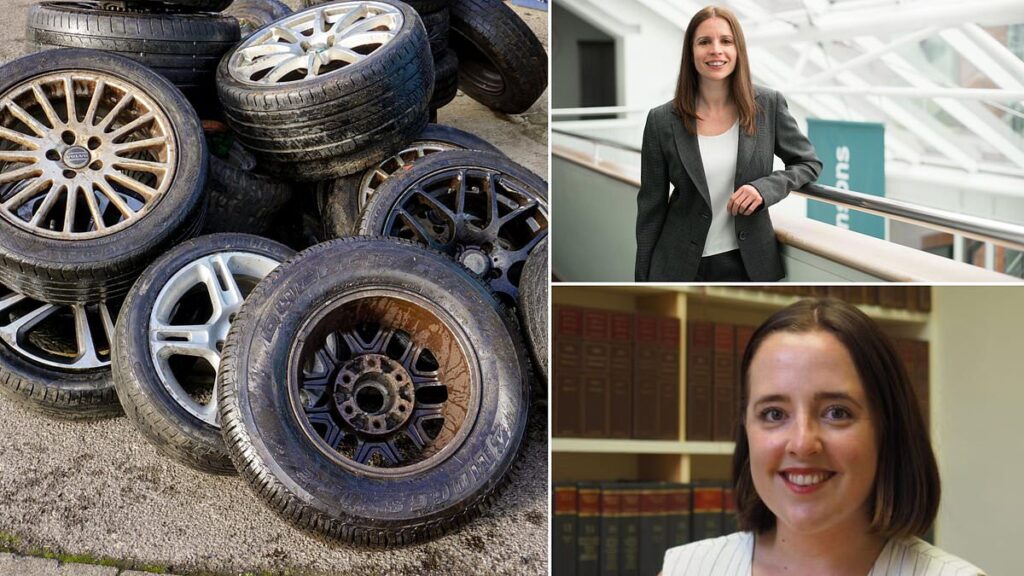I purchased my home in November 2023, and when I viewed it, understood it was next to a tyre fitting garage, with a shared driveway.
I understood parking would be on a ‘first come, first served’ basis and asked the vendors if there were any issues with the garage. They said there were no problems.
Since then, life has been extremely difficult to the point where I am considering leaving and renting the property out. I cannot sell as I am in a fixed-term mortgage.
Aside from the noise, stemming from drilling all day and loud machinery noise seven days a week, my main issue is parking. Staff also constantly leave rubbish, tyres and other items in our shared driveway and at the side of my house.

A This is Money reader lives next to a tyre fitting garage and is enduring a slew of problems
I live on a residential street and residents cannot park outside of their own homes or nearby due to the garage using all of the spaces for cars they are working on.
Two cars have been permanently parked right outside my home for over a month now without being moved. I have to park my car around the corner from my home on another street which is difficult with a toddler, baby and shopping.
I’ve contacted the council multiple times and been told there is nothing it can do. It won’t clamp the cars which are not taxed or MOT’d as it doesn’t have the resources.
When I’ve complained to the council about the rubbish and fly-tipping, it told me there is nothing it can do as it is on private land. Surely, there must be something that someone in authority can do to stop this?
Jane Denton, of This is Money, replies: The distress your circumstances are causing you is palpable. You feel your only option is to move in order to get some peace and quiet and escape the fly-tipping, garage noise and lack of parking.
Yes, you purchased a property next to a tyre garage. This came with risks, but perhaps at the time you viewed the property, it was a quieter day. Plus, the vendors did not disclose any problems to you during the purchase process.
It can be intimidating dealing with a situation like this. However, if you haven’t already, do try and hold a formal in-person meeting with the person in charge of the garage.
If it’s a chain, get in touch with the head office and get the matter escalated. Keep persisting with the council too. Also, check your property deeds to see what is and isn’t permitted at the premises. Legal redress may be limited and very expensive.
I asked two legal experts for their take on your situation.

Starting point: Solicitor Joanne Ellis thinks the reader should look at the property deeds
Joanne Ellis, a partner at Stephensons Solicitors, says: I am sorry to learn about the issues you have been facing in your home.
Often when we purchase a property it can take a little while to uncover issues that, in all likelihood, would have made us reconsider had we known about them beforehand.
If you haven’t already done so, you could approach the business owner directly to flag your concerns. While this is unlikely to stop the noise, they may agree to move the vehicles off the road or remove any rubbish which is encroaching onto your land.
If this is unsuccessful, the first thing I would say is to carefully look through the documentation you received when you purchased the property.
The deeds are a good starting point. They should, for instance, set out what the situation is in respect of the shared driveway.
Often, there will be covenants in place to prevent any storage or items being left on the driveway, as well as covenants not to cause nuisance or annoyance that the garage may be in breach of.
If there has been any misrepresentation from the sellers, you may be able to bring a claim against them.
I would also suggest familiarising yourself with what was disclosed by the seller of the property.
There are set questions within the legal documents which ask the seller to highlight any issues with neighbours. If there has been any misrepresentation from the sellers, you may be able to bring a claim against them.
I note you’ve struggled to get much back from your local authority. Sometimes persistence does pay off, so it is worth exploring and often expiring all options.
One thing you could do is look to see if the garage is abiding by the terms set out in its planning permission. The council should be able to assist with this.
They can also help with any noise pollution issues. As this is noise from a commercial premises, these types of issues are usually investigated by environmental health teams.
With respect to parking, sadly your options are limited. If the road doesn’t fall within an existing residential parking scheme, you could join forces with neighbours to ask your local authority to set one up. This may force the hand of the garage to remove the vehicles from the road.
If, as you say, the vehicles are parked on a public road without an MOT or tax then that is illegal. These should be kept on private property. Cars without an MOT can be reported to the police and those without tax reported online.

Expert: Olivia Egdell-Page says councils must look into complaints of anti-social behaviour
Olivia Egdell-Page, a partner at Joseph A Jones & Co, says: Getting in and out of the house with a baby and toddler is tricky enough, from my own experience, so I am sorry to hear that you are having such difficulties.
I note that you feel the council have not been helpful in their response to date.
Within their definition of ‘anti-social behaviour’, the council in question here include both fly tipping and also commercial noise, both of which are relevant to your situation.
Councils must look into complaints of anti-social behaviour that could be a statutory nuisance, as defined in the Environmental Protection Act 1990.
For the noise to constitute a statutory nuisance it must either unreasonably and substantially interfere with the use or enjoyment of a home or other premises, or injure health or be likely to do so.
If the council agrees that a statutory nuisance is occurring, it will serve an abatement notice. This requires whoever is responsible to stop or restrict the noise. The notice will usually be served on the person responsible but can also be served on the owner or occupier of the premises.
The difficulty is that the noise pollution you refer to is linked to the use of the premises as a tyre fitting service.
We’d love to hear from you if you have a property question and want to find out what the experts have to say on the matter.
Whether you have neighbour woes, are looking to update or move home, or perhaps you can’t decide how to sort out an extension or make a room look bigger, we want to hear from you.
If you are a prospective first-time buyer or already on the housing ladder and have a property quandary, get in touch.
Email editor@thisismoney.co.uk
Please put PROPERTY in the subject line.
Arguably, as you purchased the property in full knowledge of the proximity of this business, and the fact that the noise presumably does not exceed what you would expect for a business of this type, there may be limited powers of enforcement.
Regarding the fly-tipping, I’m afraid the council are correct here as clearing fly tipping from private land is the responsibility of the landowner.
If you are responsible for land or are a private landowner, you must ensure that your land is as secure as is practically possible.
Penalties for fly-tipping will apply if you allow someone to fly-tip on your land, and so you may wish to look at securing the property to prevent this continuing.
As to the issue with parking, this will depend on the parking restrictions in place on your street.
Where parking is limited to those holding a permit, for example, this will be subject to additional controls and so it may then be possible to prohibit parking for unauthorised vehicles.
Where parking is unrestricted, however, your options are more limited unless the vehicles are abandoned or obstructing access to and from your driveway, which I gather is not the case here.
Legal action can be costly and is likely to worsen any relationship between you and the business owner. It is advisable to resolve the problem in an amicable way, and for legal action to be a last resort.
Please also be aware that you will be required to disclose any correspondence sent or received in respect of the property and also to share details of any claims or legal action when you sell your home, which does have the potential to deter prospective purchasers.
If you do wish to move away from the property in the next couple of years, you must, therefore, weigh up the benefits of pursuing this further against the potential impact on the saleability of the property.
How to find a new mortgage
Borrowers who need a mortgage because their current fixed rate deal is ending, or they are buying a home, should explore their options as soon as possible.
What if I need to remortgage?
Borrowers should compare rates, speak to a mortgage broker and be prepared to act.
Homeowners can lock in to a new deal six to nine months in advance, often with no obligation to take it.
Most mortgage deals allow fees to be added to the loan and only be charged when it is taken out. This means borrowers can secure a rate without paying expensive arrangement fees.
Keep in mind that by doing this and not clearing the fee on completion, interest will be paid on the fee amount over the entire term of the loan, so this may not be the best option for everyone.
What if I am buying a home?
Those with home purchases agreed should also aim to secure rates as soon as possible, so they know exactly what their monthly payments will be.
Buyers should avoid overstretching and be aware that house prices may fall, as higher mortgage rates limit people’s borrowing ability and buying power.
How to compare mortgage costs
The best way to compare mortgage costs and find the right deal for you is to speak to a broker.
This is Money has a long-standing partnership with fee-free broker L&C, to provide you with fee-free expert mortgage advice.
Interested in seeing today’s best mortgage rates? Use This is Money and L&Cs best mortgage rates calculator to show deals matching your home value, mortgage size, term and fixed rate needs.
If you’re ready to find your next mortgage, why not use L&C’s online Mortgage Finder. It will search 1,000’s of deals from more than 90 different lenders to discover the best deal for you.
> Find your best mortgage deal with This is Money and L&C
Be aware that rates can change quickly, however, and so if you need a mortgage or want to compare rates, speak to L&C as soon as possible, so they can help you find the right mortgage for you.
Mortgage service provided by London & Country Mortgages (L&C), which is authorised and regulated by the Financial Conduct Authority (registered number: 143002). The FCA does not regulate most Buy to Let mortgages. Your home or property may be repossessed if you do not keep up repayments on your mortgage









